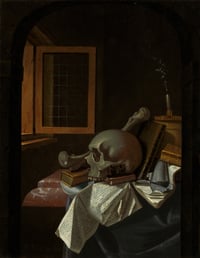 (This essay was written by Trinitas senior Claire McNeill and published recently in Classis: The Journal of Classical Christian Education.)
(This essay was written by Trinitas senior Claire McNeill and published recently in Classis: The Journal of Classical Christian Education.)
What do we picture when we think of a wise man? The image we typically conjure up is a man who is reputable, well-respected in his community, and sought by all for his sagacity. He is a man of considerable rank and influence. In most of our imaginings, he is surrounded by wealth, like Solomon or the Magi. In contrast, what do we picture when we think of a fool? One who is laughed at, scorned; when he is not ignored, he is either despised or held as ridiculous. These associations are firmly fixed in the minds of men; folly and wisdom are the difference between a child and a man, a jester and a king.
Shakespeare was well aware of this concept in the writing of King Lear; throughout the play he manipulates and challenges our ideas of wisdom and folly through their expression in his characters. Lear starts out as a figure of authority; he is a father obeyed by his daughters and a king respected by his subjects. The catalyst of this tragedy, however, is the rashness and foolishness of Lear’s actions. His wealth does not establish his security; it is the division of his wealth that causes his daughters to rise against him. His rank does not add to his credibility; it is the pride of his position that separates him from his favorite daughter and most loyal servant. By forsaking the council of those faithful to him, he ensures his own destruction. Lear’s madness can largely be attributed to senility, but the play still illustrates that folly invariably leads to destruction. Shakespeare closely associates folly with deception and greed, as we see in the play’s clearest protagonists. Regan and Goneril are initially praised for their flattery, but time reveals the wickedness of their motives. The sisters’ and Edmund’s greed for power and material gain dissolve any sense of family loyalty, which ultimately leads to their deaths. The actions of these characters directly imitate those of the Immoral Woman in Proverbs, who is the embodiment of folly. She leads men astray with sweet lies and flattery, but Solomon makes it abundantly clear that “her house leads down to death” (Prov. 2:18, NKJV). The fool of Proverbs is outside of God’s promises because he has forsaken His law. Just like King Lear, he rejects wise counsel and is easily captured by poisonous lies.
Throughout Proverbs, the Immoral Woman is contrasted with Lady Wisdom. Wisdom is not a passive character; rather she is illustrated in the first two chapters as crying out in the open squares, calling men to come and receive knowledge. She speaks truth without fear. Those who are most faithful to King Lear are those who come into opposition with him for his own good. Cordelia’s unwillingness to flatter or lie to her father is falsely interpreted as ingratitude but is really an expression of her loyalty. Cordelia's honor and wisdom are further emphasized by her willingness to stand by the truth in the face of personal loss. Kent, rather than letting Lear carry on blindly in his folly, addresses the King’s abnormal behavior and seeks to reason with him. Even the character of the Fool shows wisdom by warning Lear of the destruction that his folly will inevitably lead to. He rebukes Lear for trying to suppress the truth, comparing it to a dog being whipped and locked in a kennel. He even offers Lear a few words of practical wisdom: “Have more than thou showest, / Speak less than thou knowest, / Lend less than thou owest” (King Lear, 1.4.122-124). All of these are lessons that can be found in Proverbs, and that Lear can undoubtedly stand to learn from. In every circumstance, wisdom is bound up in the idea of Truth; it adheres to a law that transcends the inconstancy of the world. Lady Wisdom advises the reader to know God’s laws intimately, to “bind them around your neck” and “write them on the tablet of your heart” (Prov. 3:3, NKJV). Cordelia and Kent are bound by loyalty, to the king, to friends, and to family; they are bound by honor and by conscience to preserve truth at any personal cost.
Proverbs suggests that to gain wisdom, we cannot simply engage God’s law with our reason, but we must also embrace it with our hearts. Pascal comes to the same conclusion in his Pensées: “That is why those to whom God has given religious faith by moving their hearts are very fortunate, and feel quite legitimately convinced, but to those who do not have it we can only give such faith through reasoning, until God gives it by moving their heart, without which faith is only human and useless for salvation” (Aphorism 282). The wise and fortunate man is one who loves God’s law, delights in it, and meditates on it; the foolish man is he who rejects it.



